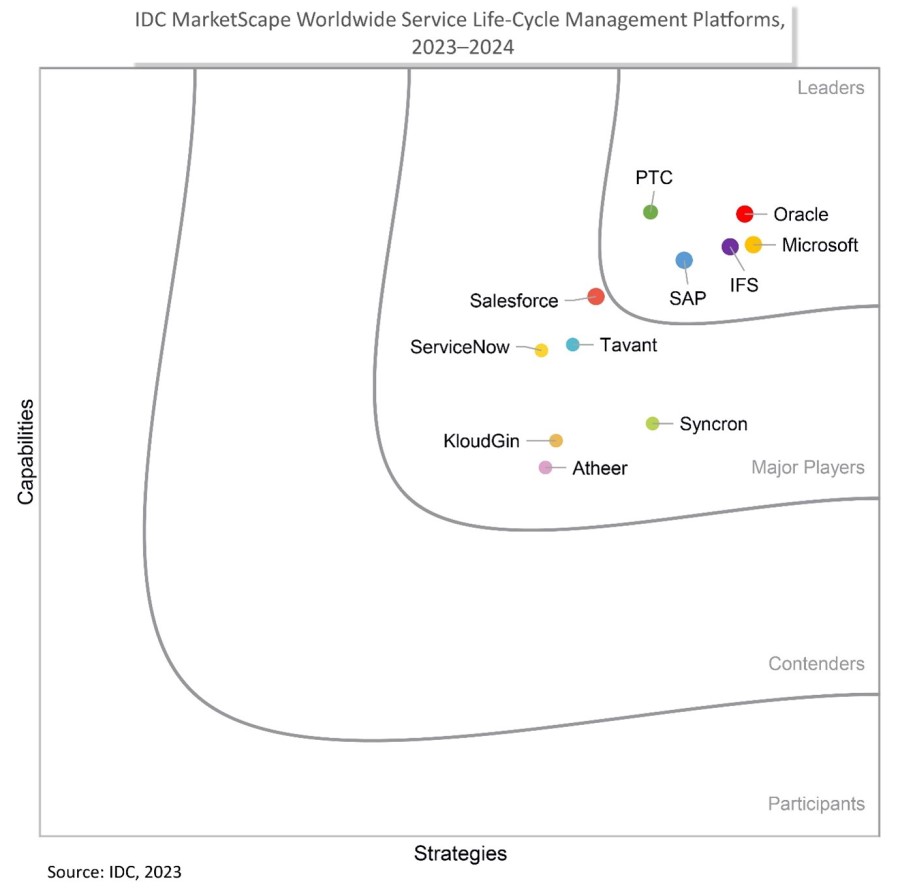
Microsoft named as a worldwide Leader in four IDC MarketScapes for Field Service Management & Service Life-Cycle
Across industries and around the world, field service leaders face any number of challenges in areas including digitalization and modernization of traditionally paper-based processes, rising customer expectations, and employee training and retention. With these challenges top of mind, we have continually invested in Microsoft Dynamics 365 Field Service as a solution to meet the growing requirements of field service management (FSM) operations. That’s why we take great pride in sharing we’re the only vendor positioned as a Leader in the following four IDC MarketScapes:
- A Leader in IDC MarketScape: Worldwide Field Service Management Applications 2023-2024 Vendor Assessment (Doc #US49989523e December 2023)
- A Leader in IDC MarketScape: Worldwide Service Life-Cycle Management Platforms 2023-2024 Vendor Assessment (Doc #US49989623, October 2023)
- A Leader in IDC MarketScape: Worldwide Field Service Management Solutions for Utilities 2023-2024 Vendor Assessment (Doc #US50036223, October 2023)
- A Leader in IDC MarketScape: Worldwide Field Service Management Solutions for Oil and Gas 2023-2024 Vendor Assessment (Doc #US50040023, November 2023)
Field service management applications

According to the 2023 report “Product Innovation and Aftermarket Service Survey,” IDC notes that “the top metric prioritized by service leaders as determining success in service was customer satisfaction (46.2%), followed by customer retention (39.0%).” This means frontline worker roles such as service agents and field technicians are absolutely critical to ensuring the best possible customer experience. That’s why we’re continuously developing Dynamics 365 Field Service so that organizations can equip those workers with modern digital tools to make them more responsive and efficient.
Microsoft was positioned as a Leader in the 2023-2024 IDC MarketScape for worldwide field service management applications based on two strengths: “innovation at scale and pace” and “infusion of AI into field service processes.” The IDC MarketScape notes that “Microsoft’s end-to-end service experience capabilities aid field service companies in a continuous transformation journey. As customer expectations evolve, frontline workforces shift, and business models get disrupted, Microsoft leverages its platform to incorporate technologies like the Internet of Things (IoT), mixed reality, industrial metaverse, and digital twins.” In addition, the IDC MarketScape says that in the areas of AI and generative AI, which would include Copilot in Field Service, “Microsoft is enabling service organizations to realize near-term and long-term strategies around this innovative technology.”
The IDC MarketScape suggests that organizations consider Microsoft field service solutions “if they are looking for a vendor that can incorporate end-to-end capabilities with innovative technologies for transformation and growth.”
Service life-cycle management

IDC has noted that service is no longer something that happens only after a sale is complete. More and more, organizations are aligning services and sales to help drive greater revenue through better alignment and new service offerings. This IDC MarketScape report highlights two key Microsoft strengths: an integrated platform supporting the front and back office, and innovation accelerators that enhance experiences.
From an integration standpoint, the IDC MarketScape notes that “the service team can no longer operate in a silo and requires tools that allow it to connect to other business functions, customers, and the wide network of partners. Microsoft’s integrated platform of back-office, midoffice, and front-office applications aids customers across their digital journey and not just within a single function.” The integration of Dynamics 365 Field Service with Microsoft 365 and Microsoft Teams is key. Dynamics 365 Field Service integrates with Outlook, Teams, and Microsoft Viva Connections so that frontline workers and managers can create, view, and manage work orders within Outlook and Teams. This integration enhances collaboration between dispatchers, frontline technicians, and managers by enabling work order data to sync automatically between Dynamics 365 and Microsoft 365. Additionally, frontline technicians can quickly start their day with access to key workday information at a glance, with work orders visible from the Viva Connections homepage in Teams. Dynamics 365 and Microsoft 365 empower technicians with the right information to resolve issues the first time, which is key to creating a positive customer experience.
When it comes to innovation, the IDC MarketScape explains, “Microsoft through its AI, GenAI, IoT, and mixed reality capabilities and tools allows service organizations to deliver enhanced experiences for the service team and the customer. Microsoft customers value this level of shared innovations, which has cemented partnerships for shared growth.” Dynamics 365 Field Service can be integrated with Microsoft Dynamics 365 Remote Assist on Microsoft HoloLens, Microsoft HoloLens 2, Android, or iOS devices to enable technicians to collaborate more efficiently by working together from different locations. This means service technicians can find and connect with technical experts working at other locations to share what they’re seeing, receive remote assistance, and quickly resolve customer issues. Dynamics 365 Field Service can also be integrated with Microsoft Dynamics 365 Guides to attach mixed reality guides to Field Service tasks. Overall, the integration between Dynamics 365 Field Service, Dynamics 365 Remote Assist, Dynamics 365 Guides, and tools like HoloLens helps to elevate field service operations by enabling them to optimize processes and deliver unparalleled customer experiences.
The IDC Life-Cycle Management report suggests organizations “consider Microsoft when searching for capabilities that will enable continuous exploration of innovation across the service life cycle and partner networks. Microsoft has enabled a broad set of innovation capabilities, which support collaboration, co-innovation, and prescriptive service at speed and a global scale.”
Field service management for utilities

For customers in the utilities industry, the IDC MarketScape explains that a key strength for Microsoft is that “[customers] recognize Dynamics 365 Field Service as a well-engineered, flexible FSM solution, offering a solid user experience in terms of usability, configurability, ease of integration into complex landscapes, and extensibility thanks to the Microsoft portfolio.”
The IDC MarketScape also notes, “Microsoft is putting considerable resources behind the product, including significantly increasing the engineering budget this year.” It also states that “[the] ability to instantly access this innovation through a pure-play SaaS ultimately results in good value for money.” Many Field Service customers experienced this with the addition of the Copilot in Dynamics 365 Field Service Outlook add-in, which streamlines work order creation with relevant details pre-populated from emails and optimizes technician scheduling with data-driven recommendations based on factors such as travel time, availability, and skillset. Frontline managers can see relevant work orders and review them before creating new work orders, and they can easily reschedule or update those work orders as customers’ needs change.
Field service management for oil and gas
For customers in the oil and gas (O&G) industry, the IDC MarketScape stated, “Microsoft’s FSM solution comes in an integrated and comprehensive portfolio catering to core O&G field services and asset operations. By seamlessly integrating FSM with Mixed Reality, Microsoft 365, AI, IoT, and Azure, it provides customers the flexibility to tailor solutions, enhancing efficiency, driving innovation, and boosting productivity in a highly customizable manner.”
“Drawing on its long-established customer base, Microsoft works with major O&G players addressing a wide range of field service challenges. Typically, these collaborations focus on enabling frontline workers and optimizing planning and service workflow automation in vast scale operations spanning large assets such as refineries, petrochemical plants, LNG facilities, renewable gas plants, and the extensive network of gas stations.” For service technicians on the frontline, a primary benefit of Dynamics 365 Field Service is the Field Service mobile app which enables technicians to see their workdays at a glance so they can view and update work orders, customer assets, accounts, and more, no matter where they are working—even in areas with limited connectivity. Technicians can also easily access up-to-date inventory information, eliminating the need for cumbersome manual inventory checks and reducing delays caused by missing parts. The Field Service mobile app also incorporates safety checklists and real-time reporting, helping to ensure compliance with safety regulations and to improve the well-being of service technicians who often work under hazardous conditions.
We invite you to read the following IDC MarketScape report excerpts for full details:
- IDC MarketScape: Worldwide Field Service Management Applications 2023-2024 Vendor Assessment
- IDC MarketScape: Worldwide Service Life-Cycle Management Platforms 2023–2024 Vendor Assessment
- IDC MarketScape: Worldwide Field Service Management Solutions for Utilities 2023-2024 Vendor Assessment
Learn more about how Microsoft customers are optimizing service operations with Dynamics 365 Field Service:
- G&J Pepsi optimize field operations, exceed service expectations while maximizing revenue and cost savings with Dynamics 365 Field Service
- Phillips Corporations modernized its service operations and increased revenue using Dynamics 365 Field Service
- Vattenfall streamlined service operations to help employees become more efficient and improve customer service and engagement.
- XTO Energy, a subsidiary of ExxonMobil, tapped into IoT and the cloud to optimize operations and drive growth with Azure and Dynamics 365 Field Service.
Source: IDC MarketScape vendor analysis model is designed to provide an overview of the competitive fitness of ICT suppliers in a given market. The research methodology utilizes a rigorous scoring methodology based on both qualitative and quantitative criteria that results in a single graphical illustration of each vendor’s position within a given market. The Capabilities score measures vendor product, go-to-market and business execution in the short-term. The Strategy score measures alignment of vendor strategies with customer requirements in a 3-5-year timeframe. Vendor market share is represented by the size of the circles.



